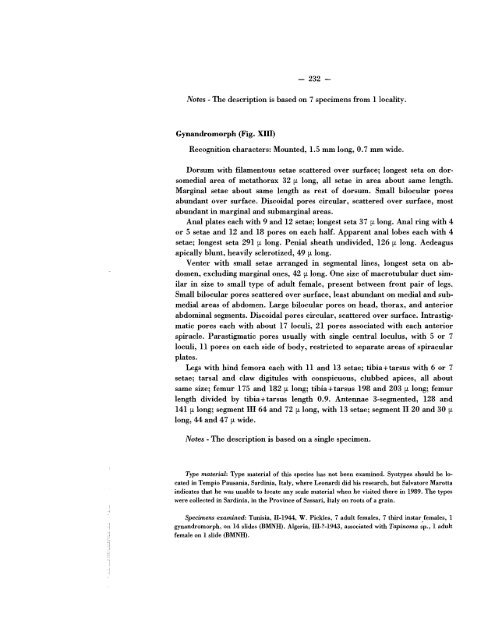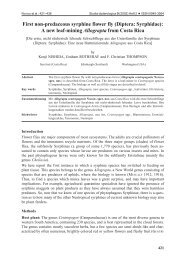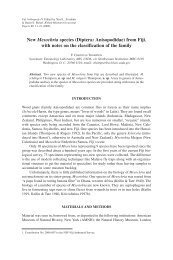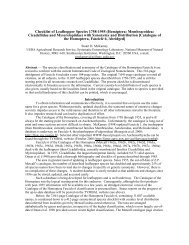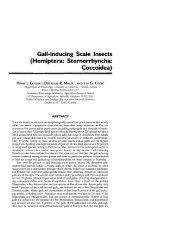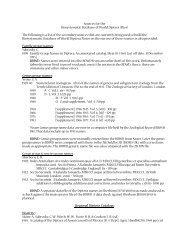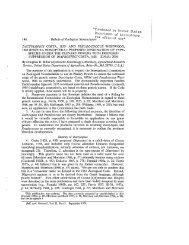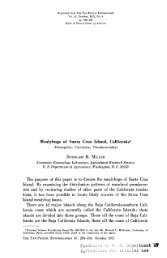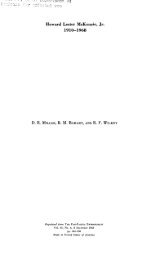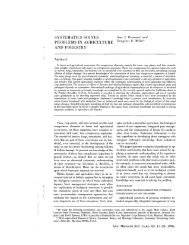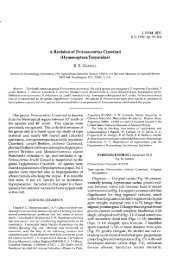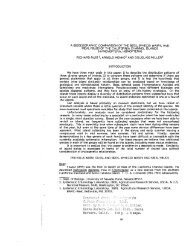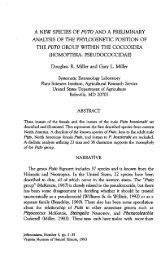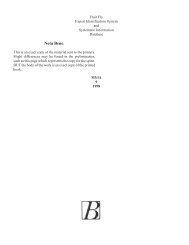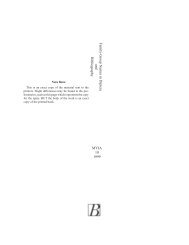Systematic revision of the Family Micrococcidae (Homoptera ...
Systematic revision of the Family Micrococcidae (Homoptera ...
Systematic revision of the Family Micrococcidae (Homoptera ...
Create successful ePaper yourself
Turn your PDF publications into a flip-book with our unique Google optimized e-Paper software.
- 232 <br />
Notes - The description is based on 7 specimens from 1 locality.<br />
Gynandromorph (Fig. XIII)<br />
Recognition characters: Mounted, 1.5 mm long, 0.7 mm wide.<br />
Dorsum with filamentous setae scattered over surface; longest seta on dorsomedial<br />
area <strong>of</strong> metathorax 32 fL long, all setae in area about same length.<br />
Marginal setae about same length as rest <strong>of</strong> dorsum. Small bilocular pores<br />
abundant over surface. Discoidal pores circular, scattered over surface, most<br />
abundant in marginal and submarginal areas.<br />
Anal plates each with 9 and 12 setae; longest seta 37 fL long. Anal ring with 4<br />
or 5 setae and 12 and 18 pores on each half. Apparent anal lobes each with 4<br />
setae; longest seta 291 fL long. Penial sheath undivided, 126 fL long. Aedeagus<br />
apically blunt, heavily sclerotized, 49 fL long.<br />
Venter with small setae arranged in segmental lines, longest seta on abdomen,<br />
excluding marginal ones, 42 fL long. One size <strong>of</strong> macrotubular duct similar<br />
in size to small type <strong>of</strong> adult female, present between front pair <strong>of</strong> legs.<br />
Small bilocular pores scattered over surface, least abundant on medial and submedial<br />
areas <strong>of</strong> abdomen. Large bilocular pores on head, thorax, and anterior<br />
abdominal segments. Discoidal pores circular, scattered over surface. Intrastigmatic<br />
pores each with about 17 loculi, 21 pores associated with each anterior<br />
spiracle. Parastigmatic pores usually with single central loculus, with 5 or 7<br />
loculi, 11 pores on each side <strong>of</strong> body, restricted to separate areas <strong>of</strong> spiracular<br />
plates.<br />
Legs with hind femora each with 11 and 13 setae; tibia + tarsus with 6 or 7<br />
setae; tarsal and claw digitules with conspicuous, clubbed apices, all about<br />
same size; femur 175 and 182 fL long; tibia+tarsus 198 and 203 fL long; femur<br />
length divided by tibia+tarsus length 0.9. Antennae 3-segmented, 128 and<br />
141 fL long; segment III 64 and 72 fL long, with 13 setae; segment II 20 and 30 fL<br />
long, 44 and 47 fL wide.<br />
Notes - The description is based on a single specimen.<br />
Type material: Type material <strong>of</strong> this species has not been examined. Syntypes should be located<br />
in Tempio Pausania, Sardinia, Italy, where Leonardi did his research, but Salvatore Marotta<br />
indicates that he was unable to locate any scale material when he visited <strong>the</strong>re in 1989. The types<br />
were collected in Sardinia, in <strong>the</strong> Province <strong>of</strong> Sassari, Italy on roots <strong>of</strong> a grain.<br />
Specimens examined: Tunisia, 11-1944, W. Pickles, 7 adult females, 7 third instar females, 1<br />
gynandromorph, on 14 slides (BMNH). Algeria, III--1943, associated with Tapinoma ;p., 1 adult<br />
female on 1 slide (BMNH).


